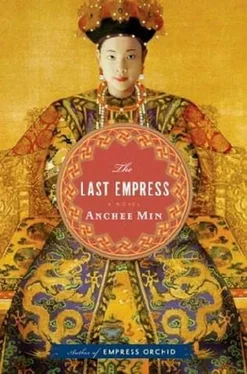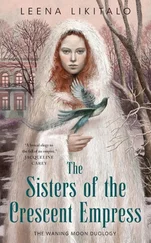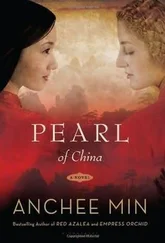"Stop it, Tung Chih."
"Mother, I have a poem for you, right here." He pointed at his head. "May I recite?"
"I don't want to hear it."
"Mother, you will like it. It is called 'To a Love.'"
"No, I won't listen."
Softly, Tung Chih began:
Parting but to journey back in lingering dreams
Along the winding corridor of filigree and the curving balustrade,
In the courtyard only the spring moon is full of sympathy,
For we who parted shining still upon the fallen flowers.
On the morning of January 12, 1875, my son died.
The Hall of Spiritual Nurturing was filled with freshly cut winter plum flowers, their waxy little petals and bare stems standing elegantly in vases. The flowers were Tung Chih's favorite. He had once dreamed of picking them in the snow, something he was never allowed to do. I was in my mourning gown, embroidered with the same winter plum flowers, which I had stayed up stitching late into the night. Tung Chih's face was turned toward the south, and he was arrayed in robes patterned with the symbols of longevity. He was nineteen years old and had been Emperor since 1861. He had ruled for under two years.
I sat by Tung Chih's casket while craftsmen finished the ironwork. Painters leaned over the structure applying their final touches. The casket was covered with carved and painted golden dragons.
I smoothed my child's cold cheeks with my fingers. Etiquette did not allow me to embrace or kiss him. Tung Chih died with a string of fever blisters around his mouth. During his last two weeks the blisters had popped everywhere, rotting his body from the inside. Sores had covered his tongue and gums, so many that he could not swallow. There had not been an uninfected spot left on his skin. Pustules had grown between his fingers and toes, oozing pus. The black medicinal paste applied by Sun Pao-tien had made him look grotesque.
Every day for those last weeks I had cleaned my son, and every day I discovered a new outbreak of pox. The new sprouted on top of the old. His hands and feet looked like ginger roots.
When it became too much to bear, I ran out of the room and my knees hit the ground. I could not pick myself up. Li Lien-ying reminded me that I hadn't been eating.
In the afternoons Li Lien-ying would chase after me with a bowl of chicken soup in his hands. He bobbed and weaved with the bowl held high because I had already kicked several of his bowls.
My hands had developed blisters. I had been doing too much work, cutting up hens, ducks, fish and snakes and offering them at sacrificial altars. I looked up at the sky and cried, "The hungry demons have been well fed. By now they are so full they should leave my son alone!"
Incense smoke made the Forbidden City look like it was on fire. My tears ran like a leaking fountain. Doctor Sun Pao-tien said it would be best if I no longer consulted him. I went to a lama, who advised that I concentrate on Tung Chih's next life. "The eternal robe and coffin would be a proper start." The lama implied that I had not offered the gods my total submission. Instead of helping my son, I was only deepening his trouble.
I thought about taking my own life to accompany my son. As I looked for a way, I realized that I was being followed. Eunuchs and maids hovered about me. Their usual placid expressions were anxious. They whispered behind my back. Whenever I got out of bed late at night, a chorus of coughing would erupt among the eunuchs.
My chef hid the kitchen knives and lye, my ladies in waiting removed all ropes. When I ordered Li Lien-ying to get opium, he brought back Doctor Sun Pao-tien. The Imperial Guards blocked me when I tried to exit the gate of the Forbidden City. When I threatened punishment, they said that Yung Lu had issued an order to keep me from harm.
My son had died in my arms as the sun was rising. The gardenia bushes in the courtyard were victims of a late killing frost, their leaves shriveled and black. Squirrels had stopped jumping from tree to tree. They sat on branches chewing nuts and making loud chattering noises. Feathers dropped from the sky when a flock of wild geese flew by overhead.
I remembered holding Tung Chih and feeling his heartbeat grow weak. I remembered falling asleep in a sitting position, so I didn't know exactly when his heart had stopped beating.
Nuharoo's chief eunuch brought the message that his lady was too grief-stricken to leave her palace.
The court had begun preparations for the memorial ceremony. Messengers were sent so the provincial governors could begin their journey to the capital.
After the doctor and his team withdrew, the Forbidden City became quiet. The sound of footsteps disappeared, as well as the bitter smell of Tung Chih's herbal medicines.
The eunuchs and maids wrapped all the living quarters with white silk cloth. The funeral dresses once worn for my husband were brought out, cleaned and pressed, made ready to be worn for his son.
Tung Chih was removed for the last time from his bed. I helped to change him. His eternal robe was made of golden thread. My boy looked like a sleeping doll with stiff limbs. I washed his face with cotton balls. I didn't like the way the royal makeup artist had done his face, layer upon layer of paint, with a wax coating to seal the makeup. My son looked unrecognizable; his skin had the shine of leather.
Finally I was left alone with Tung Chih. I touched his makeup. I washed off the layers of paint. His skin was once again itself, although scarred with the pox. I bent over and kissed his forehead, eyes, nose, cheeks and lips. I wiped cottonseed oil over his face, starting with his forehead. I tried to keep my hand from trembling by pressing against the arm of my chair. I painted his lips and cheeks with a touch of rouge to make him look the way I remembered him. I left the rest of his features untouched.
Tung Chih had a beautiful full forehead. His eyebrows had just grown into their permanent shape like two fine brushstrokes. When he was a young boy, the color of his eyebrows had been so light it looked as if he had no eyebrows at all. Nuharoo was never satisfied with the makeup Tung Chih usually wore for audiences. Especially his eyebrows. Many times he arrived late at court because Nuharoo insisted on doing his face all over again.
Tung Chih's bright eyes had been the joy of my life. Like mine, they were single-lidded and almond-shaped. In my mother's opinion, his best feature was his straight nose. It went well with his high cheekbones, which were characteristic of a Manchu. His lips were full and sensuous. In death, he was still handsome.
I followed the lama's advice and tried to treat my son's death as a natural event of life. But remorse had begun its tortuous path. My heart was soaked in its own poison.
Tung Chih's coffin was as big as his father's. It would be borne on the shoulders of 160 men. When Li Lien-ying told me that it was time to bid farewell, I stood only to fall back on my knees. Li held my arms and I rose like a hundred-year-old crone. We moved toward the coffin, where I would take a last look at my son.
Li Lien-ying asked if Tung Chih would like to take his favorite old toy, a paper model of Peking, with him. The inner circle of the city would stay with him; the outer city would be left for the paper-burning ceremony, to help send Tung Chih's spirit on its way.
"Yes," I said.
By the coffin, the eunuch asked for my son's forgiveness for having to take the inner city apart so it would fit. "Here is your Ladder Lane," Li Lien-ying said. "As Your Majesty can see, it looks like a ladder going upward onto the slope. Here comes Bag Lane and Grout Lane, the streets that we can enter but not go through. And now, on this side, the Soochow lanes. Your Majesty once asked me if the original streets were built by people from the south. They might not have been from Soochow but from Hangchow. Your Majesty didn't have time to bother with the details and small differences, but now time is on your side."
Читать дальше












